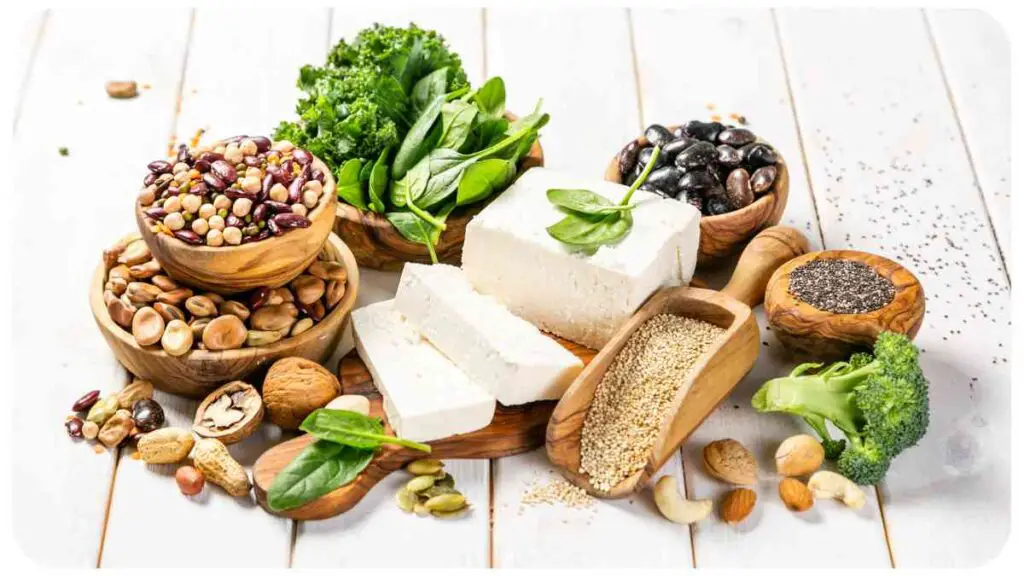Welcome to an exploration of the differences between veganism and plant-based diets. In this comprehensive guide, we will dive into the intricacies of these dietary choices, uncovering their nuances, and shedding light on the health, ethical, and environmental considerations involved.
Whether you’re a seasoned vegan or someone contemplating embracing a plant-based lifestyle, this article aims to provide you with valuable insights, tips, and anecdotes surrounding these two approaches.
| Takeaways |
|---|
| Understand the difference between a plant-based diet and veganism. |
| Consider your personal values, ethics, and health goals when choosing. |
| Ensure proper planning to obtain essential nutrients in a plant-based diet. |
| Both approaches have environmental benefits by reducing animal agriculture. |
| Pay attention to social implications and potential challenges in each choice. |
Understanding Veganism
What is Veganism?
Veganism is a lifestyle that goes beyond diet. It is a commitment to abstain from the consumption and use of animal products, including not only meat and dairy but also honey, leather, fur, and more. Veganism extends to various aspects of an individual’s life, encompassing clothing choices, personal care products, and beyond.
Vegan Lifestyle Choices

Vegans often cite ethical and compassionate reasons for their choices. They value the welfare and rights of animals, striving to reduce harm and ensure a more sustainable future. Moreover, vegans frequently align their actions with their beliefs, supporting cruelty-free and environmentally-friendly practices.
Benefits of Veganism
The adoption of a vegan lifestyle offers numerous benefits. Firstly, it reduces animal suffering by eliminating the consumption of products derived from animal exploitation.
Secondly, it has a positive environmental impact, as animal agriculture is a major contributor to greenhouse gas emissions, deforestation, and water pollution. Lastly, veganism can provide health advantages, such as reduced risk of heart disease, certain cancers, and type 2 diabetes.
“According to the article on the future of food, veganism is poised to revolutionize our dietary choices and sustainable practices, offering an ethical and environmentally conscious alternative
Table: Benefits of Veganism
| Benefit | Description |
| Reduces animal suffering | By avoiding the use of animal products, vegans contribute to reducing harm and exploitation of animals. |
| Environmental impact | Veganism significantly reduces the carbon footprint, deforestation, and water pollution associated with animal agriculture. |
| Improved personal health | Many studies have shown that following a vegan diet can decrease the risk of heart disease, certain cancers, and type 2 diabetes. |
| Ethical and compassionate lifestyle choice | Vegans align their life choices with their values of fairness, compassion, and respect for all living beings. |
| Possibility for creativity in cooking | Veganism encourages exploration of a variety of fruits, vegetables, grains, and legumes, leading to innovative and delicious plant-based meals. |
Unveiling Plant-Based Diet
What is a Plant-Based Diet?
A plant-based diet revolves around consuming whole, unprocessed plant foods while minimizing or avoiding animal products. This dietary approach emphasizes the consumption of fruits, vegetables, legumes, whole grains, nuts, and seeds. It allows for flexibility and personalization, making it accessible to a wide range of individuals.
Key Differences from Veganism
Although plant-based diets overlap with veganism in many aspects, there are distinct differences. Plant-based diets focus primarily on food choices, making their primary concern the nourishment and health benefits gained from eating plant-based whole foods.
The emphasis is not solely on ethical concerns, although they do align with certain principles of veganism.
In the blog post discussing the environmental impact of a vegan diet, readers will be astonished by the positive effects such a dietary choice can have on our planet.
Health Benefits of a Plant-Based Diet
Adopting a plant-based diet can have a profound impact on health. Scientific studies have consistently demonstrated various health benefits associated with this dietary choice. A plant-based diet is rich in fiber, vitamins, minerals, and antioxidants, which can reduce the risk of chronic diseases such as heart disease, obesity, and certain cancers.
Delving into the Distinctions

Ethical Considerations
While both veganism and plant-based diets share a focus on reducing harm to animals, veganism places a stronger emphasis on the avoidance of all animal products, including non-food items such as leather and fur. Plant-based diets, in contrast, primarily revolve around dietary choices and do not necessarily extend to other areas of life.
Learn effective strategies to gracefully navigate various social scenarios as a vegan in the insightful piece called How to Navigate Social Situations as a Vegan, which provides valuable guidance and tips.
Focus on Whole Foods
Plant-based diets prioritize whole, unprocessed foods in their natural form. This means consuming a variety of fruits, vegetables, legumes, whole grains, nuts, and seeds. The focus is on maximizing the nutritional value obtained from these plant sources, which are rich in vitamins, minerals, fiber, and antioxidants.
Environmental Impact
Both veganism and plant-based diets contribute to environmental sustainability by reducing the demand for animal agriculture. Animal farming is a significant contributor to deforestation, water pollution, and greenhouse gas emissions.
By opting for plant-based alternatives, individuals can help minimize their ecological footprint and promote a more sustainable future.
Nutritional Variations
While both veganism and plant-based diets can provide a well-rounded nutrient intake, there are some subtle differences. Vegans need to pay closer attention to consuming adequate amounts of nutrients like vitamin B12, iron, calcium, and omega-3 fatty acids, as these may be less abundant in plant-based sources.
Plant-based diets, on the other hand, often allow for more flexibility and customization in meeting individual nutritional needs.
Discover the extensive evidence behind the health benefits of a vegan diet through scientific research and studies, shedding light on the correlation between plant-based eating and overall well-being.
Table: Nutritional Comparison of Veganism vs. Plant-Based Diets
| Nutrient | Veganism | Plant-Based Diets |
| Vitamin B12 | Vegans need to ensure they consume sources of vitamin B12, such as fortified plant-based milk, nutritional yeast, or supplementation, as it is primarily found in animal-based foods. | Plant-based diets can include fortified foods and beverages, along with naturally occurring sources like fortified plant-based milk and cereals, to provide sufficient vitamin B12. |
| Iron | Plant-based sources of iron, such as legumes, whole grains, spinach, and dried fruits, can provide the necessary iron for both vegans and individuals following plant-based diets. | Similar to veganism, plant-based diets can meet iron needs through sources like legumes, whole grains, spinach, and dried fruits, ensuring an adequate intake of this essential mineral. |
| Calcium | Plant-based sources of calcium, including leafy green vegetables, tofu, fortified plant-based milk, and calcium-fortified plant-based yogurts, can fulfill the calcium requirements of vegans. | Plant-based diets emphasize calcium-rich sources like leafy green vegetables, tofu, fortified plant-based milk, and yogurt alternatives, promoting optimal calcium intake for bone health and more. |
| Omega-3 fatty acids | Vegans can obtain omega-3 fatty acids from plant sources like chia seeds, flaxseeds, walnuts, and algae-based supplements. | Plant-based diets can also include omega-3 fatty acid sources like chia seeds, flaxseeds, walnuts, and algae-based supplements, providing the necessary essential fats for overall well-being. |
Vegan vs. Plant-Based: Pros and Cons
When contemplating a dietary shift, it’s essential to weigh the pros and cons both veganism and plant-based diets offer. Each approach has its distinct advantages and considerations that may vary depending on personal preferences, health goals, and lifestyle factors.
Veganism Pros and Cons
Pros of Veganism:
- Promotes animal welfare and ethical choices.
- Reduces environmental impact and contributes to sustainability.
- Potential health benefits, including lowering the risk of certain diseases.
- Encourages creativity in the kitchen with plant-based cooking.
Cons of Veganism:
- Requires careful planning to ensure adequate intake of certain nutrients like vitamin B12, iron, and omega-3 fatty acids.
- Limited availability of vegan options in certain social settings or when traveling.
- Potential challenges in navigating non-vegan ingredients hidden in processed foods and restaurant menus.
- May face social pressures or criticism from those who don’t understand or support the vegan lifestyle.
Plant-Based Diet Pros and Cons
Pros of Plant-Based Diets:
- Emphasis on whole, unprocessed foods that provide vital nutrients and promote overall health.
- Flexibility to adapt the diet to individual needs and preferences.
- Reduces the risk of chronic diseases, including heart disease and certain cancers.
- Contributes to environmental sustainability by minimizing animal agriculture.
Cons of Plant-Based Diets:
- Requires mindful meal planning to ensure a balanced intake of essential nutrients.
- Potential challenges in finding plant-based options in certain social or cultural settings.
- May take time and effort to adjust to new cooking techniques and flavors.
- Limited availability of plant-based alternatives in some regions or food establishments.
Embark on a transformative journey by exploring the 10 mind-blowing reasons why going vegan today can have a profound impact on your health, the environment, and animal welfare.
Making an Informed Choice
When deciding between veganism and a plant-based diet, several personal factors come into play. Consider the following aspects to make an informed choice:
- Personal Values: Assess your ethics, beliefs, and motivations behind adopting a plant-based lifestyle. Reflect on your commitment to animal welfare, environmental sustainability, and health goals.
- Health Considerations: Evaluate your overall health and specific dietary needs. Consult with a registered dietitian or healthcare professional to ensure you meet your nutrient requirements.
- Transitioning Tips: For those considering a shift towards veganism or a plant-based diet, here are some practical tips:
- Start slowly by gradually incorporating more plant-based meals into your diet.
- Research and experiment with various plant-based ingredients and recipes to find those you enjoy.
- Connect with the vegan or plant-based community for support, recipe ideas, and resources.
Breaking Down the Myths
Let’s dispel some common myths surrounding veganism and plant-based diets to provide a clearer perspective on these dietary choices.
Myth #1: Veganism and Plant-Based Diets Lack Sufficient Protein

Protein deficiency is a common concern raised when discussing veganism and plant-based diets. However, by consuming a variety of plant-based proteins such as legumes, tofu, tempeh, seitan, and quinoa, individuals can easily meet their protein needs.
Table: Plant-Based Protein Sources
| Protein Source | Protein per 100g |
| Lentils | 9g |
| Chickpeas | 19g |
| Tofu (firm) | 15g |
| Tempeh | 20g |
| Quinoa | 4.4g |
Myth #2: Vegan and Plant-Based Diets Are Boring and Restrictive
Contrary to popular belief, vegan and plant-based diets offer a plethora of exciting and delicious options. From vibrant salads and hearty soups to innovative plant-based burgers and decadent desserts, there is a wide range of flavors and textures waiting to be explored.
Myth #3: Plant-Based Diets Are Unhealthy and Lack Essential Nutrients
When properly planned, plant-based diets can provide all the necessary nutrients for a healthy, balanced lifestyle. By incorporating a variety of fruits, vegetables, legumes, whole grains, nuts, and seeds, individuals can obtain ample vitamins, minerals, fiber, and beneficial plant compounds.
Conclusion
In conclusion, understanding the difference between veganism and plant-based diets allows individuals to make informed choices aligned with their values and health goals. While veganism encompasses a holistic lifestyle focused on avoiding all animal-derived products, plant-based diets prioritize whole, unprocessed plant foods while allowing for flexibility.
Both alternatives offer a myriad of benefits, including promoting animal welfare, reducing environmental impact, and improving personal health.
By considering personal factors, overcoming myths, and incorporating practical tips, individuals can embark on a fulfilling and nourishing journey towards a vegan or plant-based lifestyle. Remember, the choice is yours, and it’s essential to find a sustainable approach that resonates with you.
Further Reading
Here are some additional resources to learn more about the difference between plant-based diets and veganism:
Forks Over Knives: Plant-Based Diet vs. Vegan Diet – What’s the Difference?: This article provides a comprehensive comparison between plant-based diets and veganism, discussing the distinctions and benefits of each approach.
Piedmont.org: The Difference Between a Vegan and a Plant-Based Diet: Explore the differences between veganism and plant-based diets in this informative article, which delves into the ethical considerations, health benefits, and practical aspects of each dietary choice.
Medical News Today: Plant-Based vs. Vegan Diets: Learn more about the differences and similarities between plant-based diets and veganism in this scientifically backed article, covering health implications, environmental impact, and nutrient considerations.
FAQs
Here are some frequently asked questions about the difference between plant-based diets and veganism:
What is the main difference between a plant-based diet and a vegan diet?
A plant-based diet focuses on consuming whole, unprocessed plant foods while allowing some flexibility, while veganism extends this diet to a broader lifestyle choice that avoids all animal products, including non-food items.
Do both plant-based diets and veganism provide adequate nutrition?
Yes, both approaches can provide adequate nutrition when properly planned. However, vegans may need to pay closer attention to certain nutrients, like vitamin B12, iron, calcium, and omega-3 fatty acids, as they are less abundant in plant-based sources.
Which approach is better for the environment?
Both plant-based diets and veganism have a positive environmental impact as they significantly reduce the demand for animal agriculture, which contributes to deforestation, water pollution, and greenhouse gas emissions.
Can a plant-based diet or veganism help with weight loss?
Both approaches can be effective for weight loss due to their emphasis on whole, unprocessed foods and reduced calorie density. However, individual results may vary depending on factors such as portion sizes and overall dietary choices.
Are there any health risks associated with plant-based diets or veganism?
When properly planned, plant-based diets and veganism are generally considered healthy for individuals of all ages. However, it is important to ensure adequate intake of essential nutrients, and consulting with a healthcare professional or registered dietitian can help address any specific concerns.

Hi! My name is Hellen James, and I’m a vegan lifestyle enthusiast. I’ve been living the vegan lifestyle for over 10 years now, and it’s been one of the best decisions I’ve ever made. The food is amazing, the community is incredible, and there’s no way I could go back after experiencing all this firsthand.


